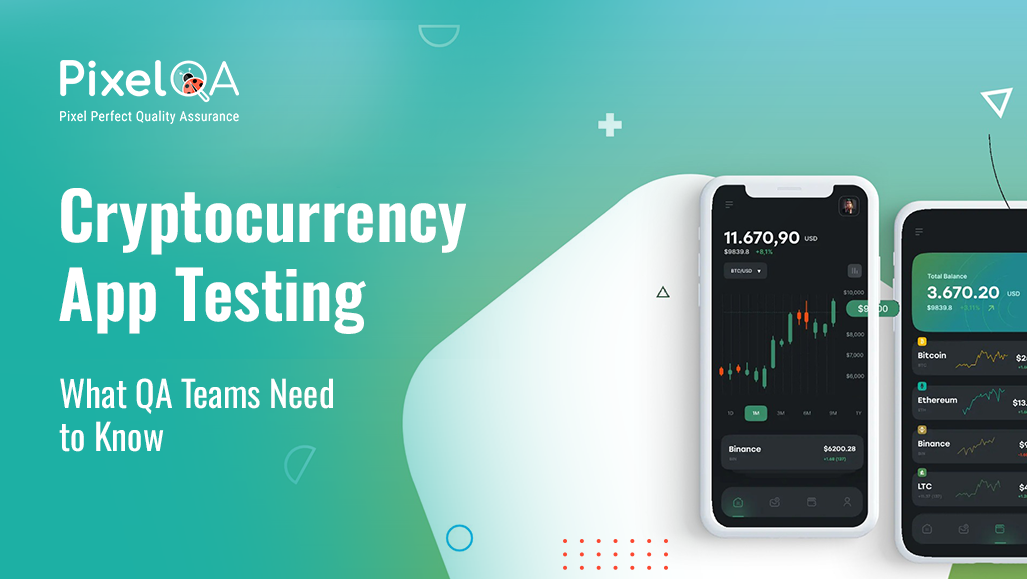
Table of Contents
Cryptocurrency App Testing: What QA Teams Need to Know
The potential of decentralized finance is great, and so is the risk. Any application of cryptocurrency, from the basic digital wallet to the most complex trading platform, is a risky universe in which a single bug can be catastrophic financially.
In this digital universe, where assets are in a state of perpetual change, rigorous testing is the cornerstone of complete trust and assurance.
Every bug, every delay in transaction verification, or every encryption flaw has the potential to erode user trust simultaneously and, in worst-case scenarios, result in crippling financial loss. Business leaders invest millions in development and design, only to discover post-launch that their app is failing in production environments, from security breaches to scaling. Quality Assurance teams and leadership are not wondering if testing needs to evolve for crypto, but rather at what speed it can keep up.
At PixelQA, we understand these challenges deeply. Our QA specialists bring extensive experience in blockchain, smart contract, and cryptocurrency app testing - ensuring that performance, security, and compliance standards are upheld from development through deployment. With advanced automation frameworks, API validation, and continuous testing pipelines, we help crypto platforms build the trust and reliability their users expect in a volatile market.
1. Understanding What Makes Crypto App Testing Different
Cryptocurrency apps are not run-of-the-mill fintech offerings. They're decentralized networks, crypto-centric at that, and deal with real financial instruments. This trifecta brings with it layers of intricacy that conventional QA methods can't manage.
- Immutable Transactions: As opposed to credit card networks, cryptocurrency transactions are non-reversible. Once a token has been moved, it cannot be reversed, so pre-launch testing is imperative.
- Decentralized Architecture: Testing needs to take into account the interaction between several blockchain nodes, smart contracts, and APIs.
- Regulatory Sensitivity: QA will need to factor in data protection, KYC, and anti-fraud regulations, which usually will be region-based.
In short, crypto QA entails a mix of security, performance, and functional testing, all adaptive to an ever-changing environment.

2. Core Areas QA Teams Must Focus On
a. Security Testing: The Non-Negotiable Priority
For crypto apps, security is paramount. One vulnerability can mean millions of lost assets. QA teams must move beyond surface-level penetration testing to encompass:
- Encryption verification: Check proper implementation of AES, RSA, or SHA algorithms.
- Wallet security: Check secure private key generation, storage, and retrieval.
- API threat modeling: Check man-in-the-middle and DDoS attack simulation.
- Smart contract audits: Check logic and block reentrancy, overflow, or access control bugs.
Including security testing within CI/CD pipelines guarantees bugs are identified early on, lowering both cost and risk.
b. Performance and Scalability Testing
Crypto apps must handle sudden spikes, in the shape of a market rush, when thousands of clients are making trades at the same time. QA teams must simulate realistic volumes of transactions, blockchain latency, and network volatility.
- Try the system behavior for different block confirmation times.
- Use stress testing software to find API and backend service limits.
- Test off-chain and on-chain data layers synchronization.
c. Functional and Usability Testing
Even the most secure cryptocurrency app will be worthless if users cannot navigate it easily. QA teams must ensure that transaction workflow, wallet generation, and trade functionality work flawlessly on different devices.
- Re-testing of multi-currency transactions and conversion accuracy.
- Checking QR scan, 2FA mechanisms, and charge calculations.
- Cross-platform testing of iOS, Android, and web apps.
d. Compliance and Data Integrity Testing
Crypto companies are getting more attention from regulators. QA teams need to make sure they're following the rules for anti-money laundering (AML), know their customers (KYC), and data privacy standards like GDPR.
- Encryption of test data at storage and transmission.
- Authentication of user consent flows and data deletion processes.
- Have audit trails for all transactions.
3. Tools and Techniques Powering Crypto QA
Effective testing of crypto applications requires a blend of traditional QA tools and blockchain-specific frameworks:
- Ganache / Truffle Suite for local Ethereum blockchain testing.
- MythX or Slither for scanning smart contract vulnerabilities.
- Postman or JMeter for API and load testing.
- OWASP ZAP for security scanning with automation.
4. Collaboration: Bridging QA, Dev, and Compliance
Cryptocurrency testing isn’t a solo act. QA must work closely with blockchain developers, DevOps engineers, and compliance officers.
- QA offers real-time feedback loops within sprint cycles.
- DevOps enforces test automation and environment parity.
- Regulatory testing priorities are led by compliance teams.
5. Building a Future-Ready QA Strategy
- Investing in skill building: Educate teams on blockchain basics, smart contract logic, and cryptography.
- Embracing automation: Minimize manual intervention and speed up release cycles.
- Embracing risk-based testing: Prioritize effort where the effect is greatest, often wallet manipulation, transaction flow, and data protection.
- Utilizing test analytics: Employ metrics such as defect leakage rate and mean time to detect (MTTD) to refine QA maturity.
Conclusion
Trust is what makes success in the world of cryptocurrency, and testing is the mechanism that creates it. Companies that view Quality Assurance as a strategic activity rather than a post-launch patch put themselves at an advantage over their rivals.
In a climate where every single transaction counts, investing in quality crypto app testing is the least you can do to ensure user trust, brand reputation, and long-term growth.
